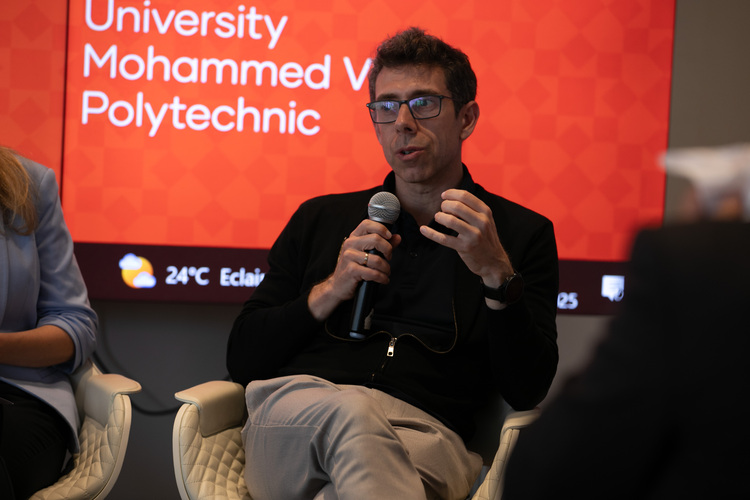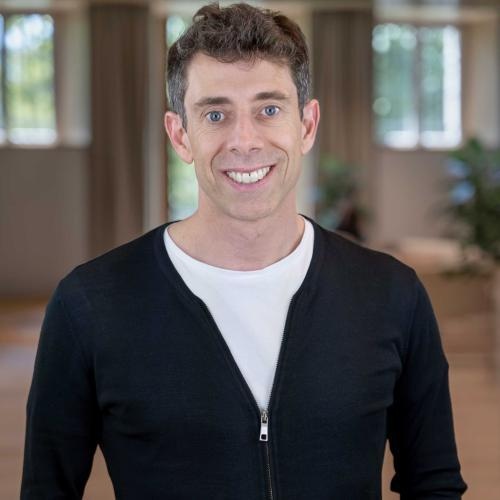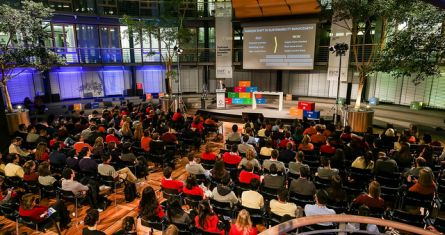Designing the digital future
Inside ESCPTech’s human-centric approach to innovation
As technology becomes more impactful and influential, the need for reflective, cross-disciplinary research on the societal implications of innovation is both timely and acute. As part of ESCP Business School’s LIGhTS strategic framework—focused on leadership, innovation, geopolitics, and sustainability—the ESCPTech Institute (ESCPTech) examines the economic, ethical, and strategic dimensions of emerging technologies.
Directed by Professors Frédéric Fréry and Héctor González-Jiménez, the Institute draws on a wide range of disciplinary perspectives, including management, marketing, law, and entrepreneurship, as well as fields at the intersection of technology and society.
From concept to interface: the Institute’s mandate
As part of the LIGhTS initiative, ESCPTech was established to structure and amplify ESCP’s research impact on digital transformation and emerging technologies. Acting as an interface, it connects faculty across disciplines, fosters collaboration with industry, and brings visibility to work that might otherwise remain siloed. Beyond mapping activity, the Institute helps translate it—framing questions for policymakers, businesses, and civil society, while maintaining academic rigour and a long-term view.
“Our aim is to connect academic knowledge with real-world questions,” note Professors Fréry and González-Jiménez. “We want to bridge the gap between rigorous research and the pressing challenges organisations face when navigating technological change—not through surface-level commentary, but by developing frameworks and insights that are grounded, durable, and relevant. Our goal is to remain intellectually anchored while supporting more informed decision-making across sectors.”
Our aim is to connect academic knowledge with real-world questions. We want to bridge the gap between rigorous research and the pressing challenges organisations face when navigating technological change—not through surface-level commentary, but by developing frameworks and insights that are grounded, durable, and relevant. Our goal is to remain intellectually anchored while supporting more informed decision-making across sectors.
Directors of the ESCPTech Institute
Rethinking technology: the ESCP way
At the heart of ESCPTech’s work is a historically aware, but future-facing view of technology—not as a linear force for disruption, but as part of a larger cycle of institutional and human adaptation. Professors Fréry and González-Jiménez share a resistance to treating each new wave of innovation as wholly unprecedented.
“Back in the 1960s and 70s, there was fascinating research on what happened when computers were first introduced into companies,” Fréry recalled in conversation. “They altered the internal balance of power, challenged established roles, and created uncertainty—exactly the kinds of dynamics we observe again today with AI. The context is different, but the human responses are remarkably similar.”
González-Jiménez added that while the technologies may be more advanced, many of the questions remain the same. “What you see with every generation of technology is this belief that it will force us to throw out everything we know,” he noted. “But in reality, most management models can still be applied—they just need to be reinterpreted.”
This perspective—cautious, interpretive, and grounded—runs through their shared vision for the Institute. It is not a place for fast declarations or trend forecasting. Instead, ESCPTech positions itself as a space for examining technologies in their broader organisational and social context, including the assumptions embedded in their design.
“If we want technology to serve inclusive and ethical goals,” said González-Jiménez, “we need to ensure the teams building it are interdisciplinary and diverse. And we need to understand that optimisation for one stakeholder—shareholders, for instance—may come at the expense of another, like users or employees.”
This is not a rejection of technological innovation, but a call to engage it on different terms. “We need to stay intellectually calm,” Fréry remarked. “New tools don’t always require new theories. But they do require us to think clearly about which frameworks still work—and why.”
Multi-campus, multi-disciplinary model
ESCPTech’s structure reflects its intellectual stance. Decentralised and cross-disciplinary by design, the Institute spans ESCP’s six campuses and engages faculty from diverse academic backgrounds—including management, marketing, law, and entrepreneurship. This enables it to approach technology not as a siloed topic, but as a phenomenon that reshapes strategy, regulation, identity, and power across multiple domains.
Its research activity is anchored by a range of initiatives that mirror this perspective. From the Internet of Things Chair’s work on connected value systems, to research on new platform strategies, to policy-oriented contributions from the European Centre for Digital Competitiveness, each project combines applied insight with conceptual rigour.
What links these efforts is not a singular focus on AI or digital tools, but a commitment to examining how technologies intervene in institutional life—and how organisations respond, adapt, or resist.
Anchoring research in real-world systems
Among ESCPTech’s most ambitious current initiatives is the development of the AI and Green Innovation Index, which is designed to assess how companies’ integration of artificial intelligence contributes to—or detracts from—their environmental sustainability goals.
The idea emerged from a basic observation: while AI is widely associated with operational efficiency, its environmental impact remains poorly understood. “The question we’re asking,” said Professor Héctor González-Jiménez, “is whether AI adoption can support a company’s green transition—not just as a side effect, but as a measurable, strategic outcome.”
The Index aims to provide organisations with a structured way to evaluate how their use of AI technologies affects variables such as energy consumption, waste generation, resource optimisation, and circularity. It is not a certification tool, but a benchmarking framework to support strategic planning, investment, and policy alignment.
The initiative also seeks to inform regulators. “There’s real interest in understanding the intersection between AI policy and environmental policy,” Professor González-Jiménez noted. “If we can demonstrate where AI supports sustainability—and where it doesn’t—it opens the door to more targeted regulation and funding instruments.”

Europe as a lens, not just a location
The Institute’s location across Europe is not incidental to its mission. Operating within a region known for its regulatory ambitions and ethical framing of technology, ESCPTech is positioned to ask questions that are often sidelined in more commercially driven environments: How should technologies be governed? What risks are we willing to accept? Who bears responsibility for long-term societal impacts?
Yet the directors are fully aware of the structural obstacles that accompany this perspective. “There’s a race dynamic,” Professor Héctor González-Jiménez observed. “No one wants to be the first to slow down. The economic and political incentives simply don’t support careful, collective governance.” In our discussion, the metaphor that surfaced was striking: AI as a kind of arms race—fuelled not only by technological ambition, but by the anxiety of being left behind.
Fréry pointed out that while Europe prioritises regulation, ethical alignment, and public accountability, it faces mounting dependency on infrastructures developed elsewhere—particularly in the United States. “This has implications not just for competitiveness,” he said, “but for democratic control. When the systems you rely on are designed and operated outside your jurisdiction, your autonomy is fundamentally constrained.”
Their reflections made it clear that global coordination is unlikely to emerge organically. “Maybe it will take a crisis,” González-Jiménez suggested — “something significant enough that it forces everyone to pause and reconsider the trajectory we’re on.”
Still, both emphasised that Europe’s task is not to match speed, but to ask the right questions. “Europe’s contribution may not be scale,” Fréry said. “But it can be thoughtfulness. Governance. Framing.”
Beneath these reflections is a shared belief that technology does not outpace history—it reiterates it. “Human motives don’t change,” González-Jiménez observed. “We just apply them to new tools. The ambitions, the blind spots, the inequalities—they resurface. And that’s where we, as researchers, need to pay attention.”
This is the role ESCPTech carves out for itself—not to offer prescriptions, but to act as a space for sustained, critical reflection. To contribute not just output, but orientation—anchored in context, and intended for use. For Professors Frédéric Fréry and Héctor González-Jiménez, success does not mean visibility or scale, but utility: the ability to inform more deliberate choices. “If a project like the AI and Green Innovation Index ends up being used—really used—to shape sustainability strategy, that’s enough,” said Professor González-Jiménez. “That means we’ve made a contribution.”
Human motives don’t change. We just apply them to new tools. The ambitions, the blind spots, the inequalities—they resurface. And that’s where we, as researchers, need to pay attention.
 Professor Héctor González-Jiménez
Professor Héctor González-JiménezProfessor Fréry added that at a time when urgency often outpaces understanding, the capacity to slow down and reflect is not a luxury but a responsibility. In an environment saturated with speed and noise, ESCPTech argues for something else: thoughtful experimentation, long-term perspective, and the courage to ask harder questions before offering answers.
Relevant links
Campuses

